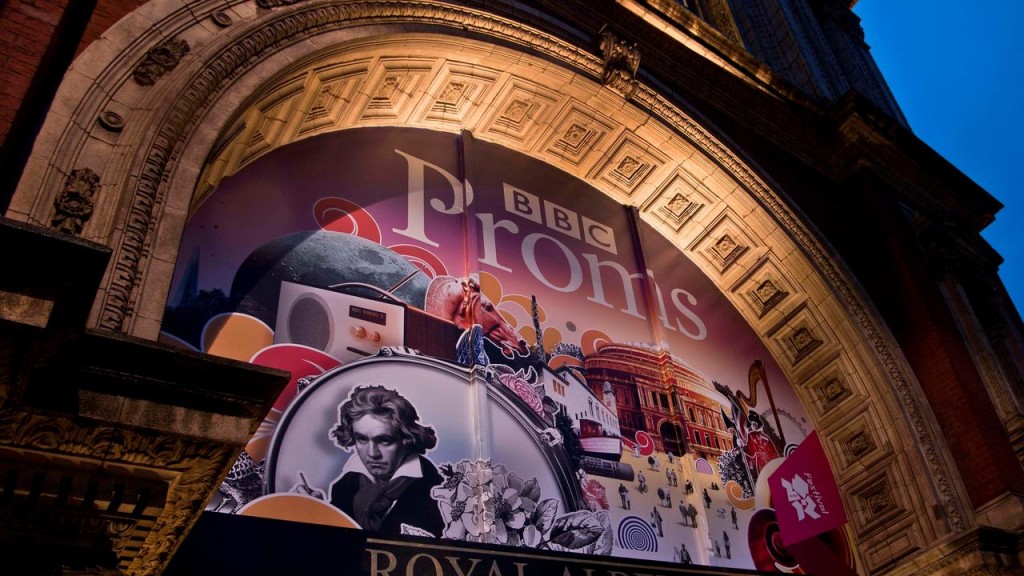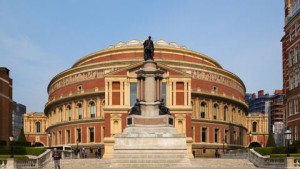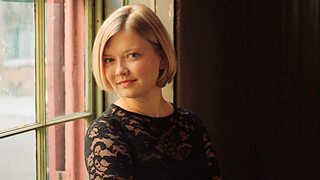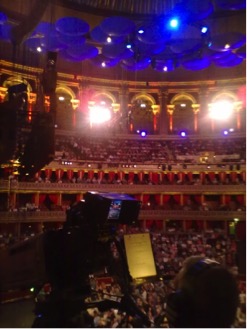Behind the scenes at the Proms
Kerry-Ann Bronner spent the summer between years 2 and 3 learning all about the complexities of mounting the Proms, and applying knowledge from her degree course (as well as her tea-making skills!) to a real life employment context:
 In May this year, I learned of an exciting opportunity offered by the BBC to spend a few weeks on a work experience placement within the Music Television department, working on the Proms. The Proms have always been an event I look forward to in the summer and so I thought I would try my luck at applying. I was keen to find out about different career options, and despite the extent of my television experience being limited to watching the Proms on BBC Four, I hoped the musical experience and knowledge gained from my degree so far at Southampton would stand me in good stead. It obviously did, as I was shocked and delighted to discover a few weeks after applying that I had been successful.
In May this year, I learned of an exciting opportunity offered by the BBC to spend a few weeks on a work experience placement within the Music Television department, working on the Proms. The Proms have always been an event I look forward to in the summer and so I thought I would try my luck at applying. I was keen to find out about different career options, and despite the extent of my television experience being limited to watching the Proms on BBC Four, I hoped the musical experience and knowledge gained from my degree so far at Southampton would stand me in good stead. It obviously did, as I was shocked and delighted to discover a few weeks after applying that I had been successful.

My placement was for three weeks and I would be working as a Production Runner, with some days based in the Music Television office and other days at the Royal Albert Hall. My job involved assisting the Production Team with general office admin and paperwork, running errands, looking after the presenters when at the Hall, helping with film shoots, carrying out research and anything else that would help with the production of content for television. One thing I learned during my three weeks was that no two days are the same! I really enjoyed the variety of tasks and hadn’t expected to be given jobs to do by myself – I had been expecting to maybe shadow somebody and eventually be allowed to work on things towards the end of the placement when I had gained a bit more experience. That for me was great, as it allowed me first-hand to find out what the work involved as well as really helping my confidence, knowing I was trusted to get on with a task.

Despite being considered as an entry-level job, I learned just how much is involved in the role of a runner and how even simple jobs, such as ensuring the team are looked after with cups of tea, really helps the production as a whole. My first day of training provided me with an introduction to working at the BBC and a tour of both New and Old Broadcasting House. There was also the exciting moment of collecting our official BBC lanyards that would allow us entry to BBC buildings and the Royal Albert Hall once we had completed all the necessary training! It was a whole new experience for me being in London and I soon discovered first-hand the perils of using the Tube if you aren’t a seasoned commuter by getting left behind on the platform when we were heading off to the Royal Albert Hall for our induction.
On the days that I was based in the office, I helped with tasks such as collecting video tapes and CDs from the archives, printing paperwork and preparing music briefs that would be used to assist the presenter for the Proms Extra television ‘magazine’ show. Each brief would provide background information on a composer and the works being performed at a particular Prom and runners would help the researcher compile the information. This was where the skills I’ve gained so far in my degree at Southampton were very helpful, particularly the broad range of musical genres I’ve been introduced to and being able to reference sources correctly. My musical knowledge also helped when I had the task of transcribing an interview between Proms presenter Samira Ahmed and the Russian violinist Alina Ibragimova.

Alina is one of my favourite performers, so for me this was a labour of love! Transcription involves making an accurate note of the time during the interview for each question and answer and writing down word for word what is said. This makes it a lot easier for whoever comes to edit it later on, as they can pinpoint the key parts of the interview rather than have to listen to it in its entirety. Working in television is fast-paced, so anything that saves time is welcome.

The days where I worked at the Royal Albert Hall were definitely some of the busiest, as well as some of the most exciting. I will never watch the Proms in quite the same way again now I appreciate just how much work goes on behind the scenes. We would usually work as a group of 3 or 4 runners with the Head Runner and would each be assigned a specific role for the day. This could be looking after the presenter/s, working in the production office or being assigned to the Scanner truck to ensure the team had everything they needed. The Scanner was the hub of the operation, a large outside broadcast truck where the director, producer, vision mixer, score reader and rest of the edit team would receive all the footage from the cameras in the Hall on a wall of monitor screens and orchestrate the order of shots.

Being at the Hall was a real privilege and the novelty of being in such an impressive venue is one I think will never wear off. One statistic that was often heard is that the hall goes as far below ground as it is tall. I’m unsure how true this is but after my first full day working there, my feet definitely appreciated just how many stairs and corridors there were backstage!
A typical day of filming at the hall would begin with a Production meeting where all the important paperwork for the day was handed out and it was the runners’ job to ensure the paperwork was distributed to everyone who needed it around the hall, for example the lighting team and the edit truck. Paperwork included the day’s schedule, the concert running order and shot lists for the cameras, not forgetting the all-important lunch and dinner menus too! Following the meeting, we would help out with any preparations for the filming and rehearsals. Any changes to the script would need to be re-printed and then stuck onto the presenter cards and numbered in order. Tea and coffee runs were essential to keep the hard-working team going throughout what was often a long day and also a guaranteed way to make yourself popular, particularly if you remembered biscuits too! Once the presenter arrived, their assigned runner would need to escort them punctually to rehearsals and make-up, as well as being on hand for any other errands. When recording started it would usually go quiet for the runners but it did give us the opportunity to watch the performance, sometimes from the Scanner truck or even in the Hall if we were lucky.

I was lucky enough to be able to watch the Aurora Orchestra’s performance of Beethoven’s ‘Pastoral’ Symphony, which they played from memory. That was definitely a highlight for me, as was also being able to watch Alina Ibragimova’s performance of Bach’s solo Partitas and Sonatas from the Scanner truck. It was literally the best view of the concert as I could see all the different camera angles on the monitors and it was fascinating to watch the director at work as they guided the camera team over the radio to get the best shots. Hearing instructions of “More mushrooms please”, or “Cut her head off” could have been quite disconcerting without knowing the context in which it was meant!
My time at the BBC gave me a real insight into music television and I was able to experience a great variety of aspects involved in the work. Another day I especially enjoyed was being able to help out as a runner for a film-shoot for a VT, or video-tape. As I soon found out, a lot of television production terminology dates from the early days of film. I have no experience of filming, so this was something I was particularly keen to take part in. The film-shoot was of the Aurora Orchestra rehearsing Brett Dean’s Pastoral Symphony at Henry Wood Hall and the team were aiming to get some close-up footage of the more unusual percussion instruments used in the piece, in particular the thunder-sheet. My job was to log the rushes. For anyone like me with no idea what this meant, this translated as noting down the times when key shots were taken or anything particularly interesting happened so when it came to be edited, the editor could go straight to the important parts. I learnt that ‘rushes’ is the name given to any raw, unedited footage taken on a film-shoot. As a musician, it was a privilege to be able to watch the Aurora Orchestra in rehearsals with their conductor Nicholas Collon. The camera team were really helpful and I learnt a lot from observing them in action. I was also really pleased to find my finished log included all the details they needed.

Another memorable time working at the Hall was where I was assigned to look after one of the presenters for the day, the lovely Clemency Burton-Hill. The Prom for that night was the Story of Swing which everyone was excited about as it featured not one, but two big bands and promised to be an entertaining concert. It was a busy day as there were lots of rehearsals to get through. There were several changes to the script which meant many re-prints and lots of cutting and sticking with time fast running out. It could all have got very confusing and stressful had it not been for the fact that we all worked together as a team and everyone helped each other out. Possibly my most nerve-wracking task that day was steaming Clemency’s dress that she would be wearing when presenting! However, everything went well and the concert was a huge success, with many of the audience on their feet and dancing to the infectious swing numbers. One bonus of looking after a presenter is that you are able to be in the hall for the concert and it was a really memorable evening. I also learned just how much work goes into presenting – the professionalism of Clemency and her co-presenter Clarke Peters made it look easy.
My three week placement was such an exciting time. I feel extremely fortunate to have worked on the Proms and it was a real privilege to work with such talented people who were all clearly passionate about their work. Their enthusiasm was infectious and I learned a great deal during my placement, as well as making some useful contacts. The skills I have taken away include time management, working to deadlines and clear communication. These will all help me both in my final year at Southampton and also in any future career, as will the greater sense of confidence I left with as a result of my achievements. It has also opened up several career paths to me that I may not necessarily have considered before my time with the BBC. I particularly enjoyed working with the researchers and this is an area I would like to pursue further. The BBC offers many opportunities within music and following my placement I am also keen to find out more about the roles available within classical music radio. I thoroughly enjoyed my placement and would definitely recommend it to anyone else who is considering a career in music television, or who, like me, was just curious to find out other options with a music degree.
A very big thank you to all the Music Television team at the BBC!

